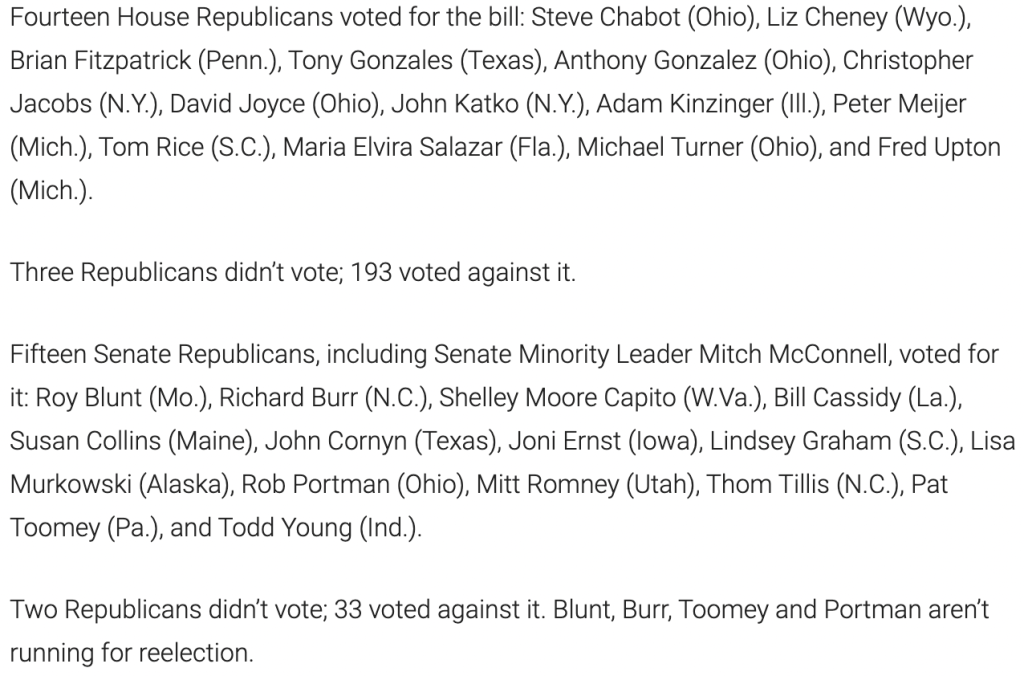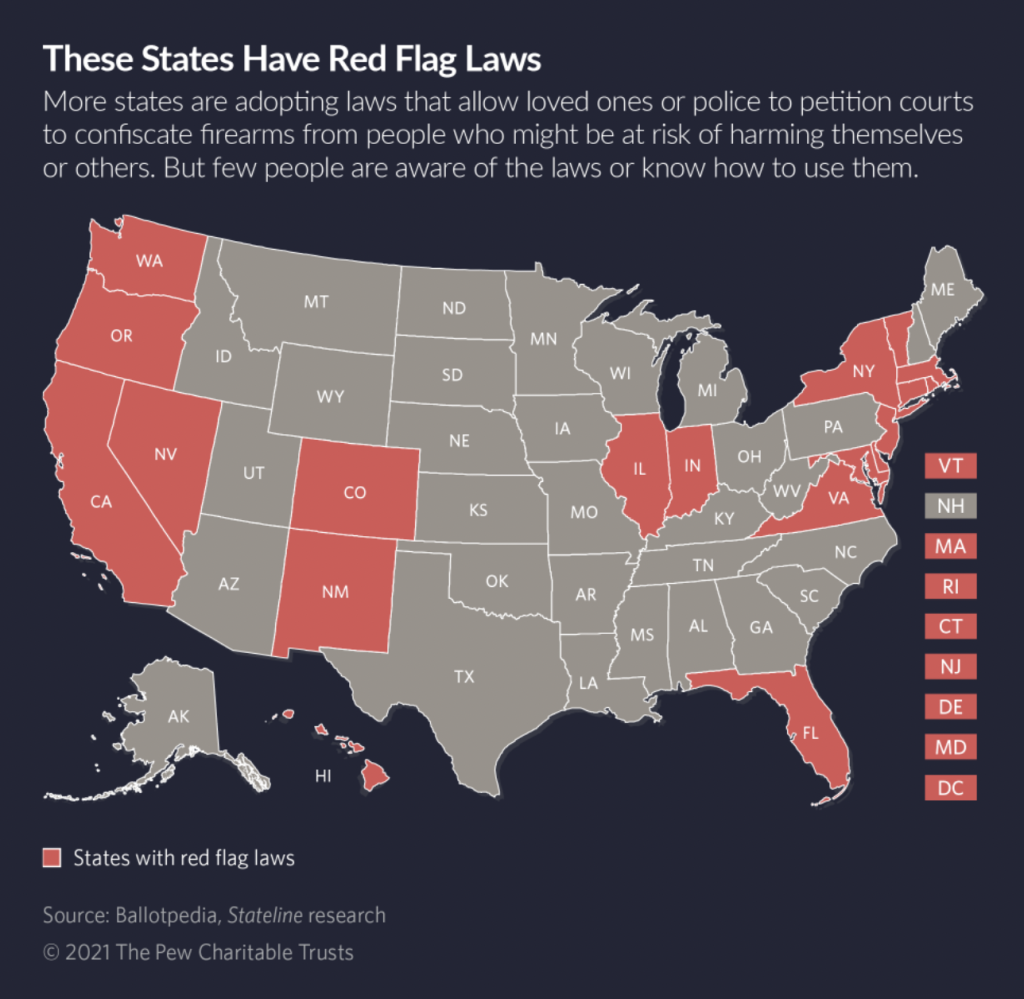The expansive S2938 gun control bill signed by President Biden on Saturday, Jun 25, incentivizes states to adopt red flag laws. 15 Republicans in the Senate and 14 in the House supported the bill. Lisa Murkowski of Alaska and Todd Young of Indiana are the only two Senators of the 15 who are up for reelection this year.
 Source:https://www.thecentersquare.com/national/biden-signs-bipartisan-gun-control-measure-supported-by-29-republicans/article_7e097180-f41c-11ec-9f0e-873d60446234.html
Source:https://www.thecentersquare.com/national/biden-signs-bipartisan-gun-control-measure-supported-by-29-republicans/article_7e097180-f41c-11ec-9f0e-873d60446234.html
The 80-page bill dubbed the "Bipartisan Safer Communities Act" entices states with grants—financial incentives to adopt "red flag" laws. It also toughens up background checks for 18 to 21-year-olds. Leader McConnell supported the bill, saying it is a "commonsense package of popular steps that will help make these horrifying incidents less likely while fully upholding the Second Amendment rights of law-abiding citizens."
Biden says "lives will be saved" with the new law:
"Time is of the essence. Lives will be saved. From Columbine to Sandy Hook to Charleston, Orlando, Las Vegas, Parkland, El Paso, Atlanta, Buffalo, Uvalde, and for the number of people killed every day in the streets we don't even hear about. How many times have you heard that? 'Just do something, for God's sake just do something?'
"Today, we did," he continued. "Today. We say more than enough... There are times when it seems impossible getting things done in Washington. We are doing something consequential. We can reach compromise on guns."
Proponents of the Second Amendment argue potential failure to implement due process is at the heart of resistance to red flag laws. Citizens should, in theory, have a right to argue their case in court. "Red flag laws make it easier for law enforcement agencies to take guns away from people who have demonstrated potentially violent mental instability. Judges have to approve law enforcement request[s] for such seizures." That means courts must consider clear and convincing evidence that the individual is not mentally stable enough to own a gun. Unfortunately, some courts are erring on the side of "better safe than sorry," according to Kendra Parris, a Florida attorney who has defended at least 20 clients who have been threatened with removal of their firearms.
Family members can also weaponize red flag laws. The "boyfriend loophole" has long been a political sticking point in gun legislation. "Federal law currently only bars people from purchasing a firearm if they are convicted of domestic violence while living with their partner, married to their partner or have a child with their partner." However, many Democrats have argued "to extend that coverage" to dating partners. The signed law closes the loophole by adding "continuing relationship of a romantic or intimate nature" with their partners. Some states do not have penalties for malicious or false accusations. There should be a "penalty for maliciously false accusations, which several states have adopted," said Dave Kopel, research director at the Independence Institute. There is evidence, however, that those who falsely report are rarely prosecuted.
Senator Rand Paul raised many of these questions when he slammed red flag laws on the Senate floor on Jun 23. "The problem isn't a lack of laws to stop these killers; it is the persistent lack of application of existing laws," he argued.
According to wfla.com, there have been 49 shootings in the United States with at least four victims according to the Gun Violence Archive. Of the nearly 50 shootings, 17 occurred in states with what are known as red flag laws. Across the U.S., only 19 states and the District of Columbia have red flag laws." The court must petition the removal of a gun in those states.
 Graphic/Pew/https://www.pewtrusts.org/en/research-and-analysis/blogs/stateline/2021/10/05/red-flag-laws-are-saving-lives-they-could-save-more
Graphic/Pew/https://www.pewtrusts.org/en/research-and-analysis/blogs/stateline/2021/10/05/red-flag-laws-are-saving-lives-they-could-save-more
Lawmakers say that S 2938 continues to protect lawful gun owners, and there was ample attention given to ensuring that every "person has his day in court."
What Else is in the Legislation?
The law heavily emphasizes mental health provisions for children and families. Telehealth through Medicaid is expanded, as are healthcare services in schools. Suicide prevention, school-based mental health and safety, and funding for primary care training are all included. The bill also "provides $750 million in funding over five years to states to support 'crisis intervention services,'" including the enactment of red flag laws. In addition, the bill "establishes the first federal criminal offenses and penalties for "straw purchasers" —people who purchase guns on behalf of others, usually those who would be banned from purchasing a firearm such as violent criminals, drug dealers, and terrorists. Interestingly, it also "prohibits K-12 funding from being used for providing anyone with, or training anyone to use, a dangerous weapon." The intent of that clause is unclear; however, it could mean schools will be discouraged or financially de-incentivized from providing proper self-defense training for staff.
A list of the appropriations below shows a massive burden on the American taxpayer. A note at the bottom stating the CBO score for the legislation estimates the bill will reduce the deficit by $154 million over ten years. $15 billion in new federal funding for mental health programs and school security upgrades will be added. The National Rifle Association opposes the legislation. That is some crafty math right there.
 Gun Law Appropriations Summary
Gun Law Appropriations Summary


